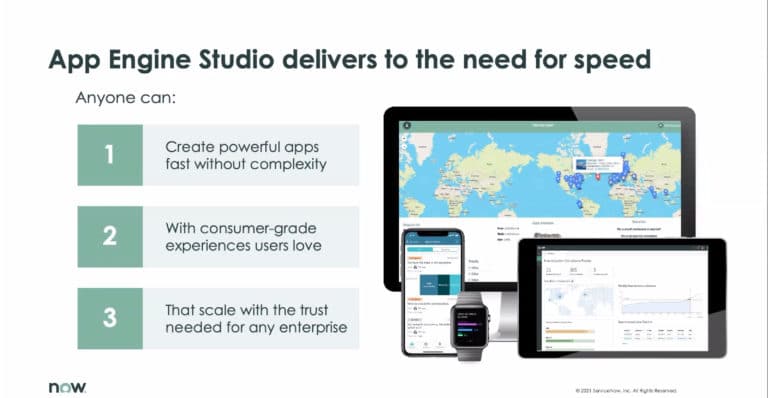Today ServiceNow announced a new version of its platform named Quebec. It includes a whole list of new features and extensions, but the most important is the App Engine Studio. With this, ServiceNow is now fully entering the low-code market.
ServiceNow introduces a new version about every six months. Today it is launching Quebec as the successor to ServiceNow Paris. Every six months, the company releases a major update, giving the ServiceNow platform new features. It’s a strategy that many companies will envy because we’ve been following ServiceNow for some time now, and every release contains major new features and capabilities. At many other companies, you usually see major and minor updates alternating.
For this Quebec release, we attended a presentation by Chris Pope, vice president of innovation at ServiceNow. Afterwards, we spoke to the man as well, so he could answer our burning questions.
ServiceNow platform at the heart of your IT strategy
ServiceNow’s strategy is very clear: it wants to be at the heart of every organisation with its platform, which it still calls the platform of platforms. The idea is that companies should run everything via the ServiceNow platform. ServiceNow has already laid the groundwork by controlling IT processes, HR processes, workflows and starting today for low-code and no-code application development.
Developing applications on top of the ServiceNow platform is nothing new. Pope told us that it has been possible since 2006, but that required actual programming. That’s fine for some companies, but given the speed at which companies want and need to innovate, the lack of developers and the costs involved, low-code is an excellent alternative.
Related: Nobody knows what ServiceNow does, or what it can do for you
Low-code and no-code
Using low-code and even no-code, business users who have no programming knowledge but are nevertheless skilled in using Excel, for example, can build their own applications on top of the ServiceNow platform. This was already possible with low-code for workflows, but now complete application development has been added. The ServiceNow platform can be used to build applications for the web and mobile devices.
To that end, ServiceNow today released App Engine Studio, which all ServiceNow customers can download and get started right away. For ServiceNow customers, App Engine Studio is included in their licence at no additional cost. According to Pope, about 70 percent of the App Engine Studio is currently focused on low-code. However, in the upcoming platform versions, ServiceNow will try to make development even simpler so that there is more no-code, and that share will increase from the current 30 percent.
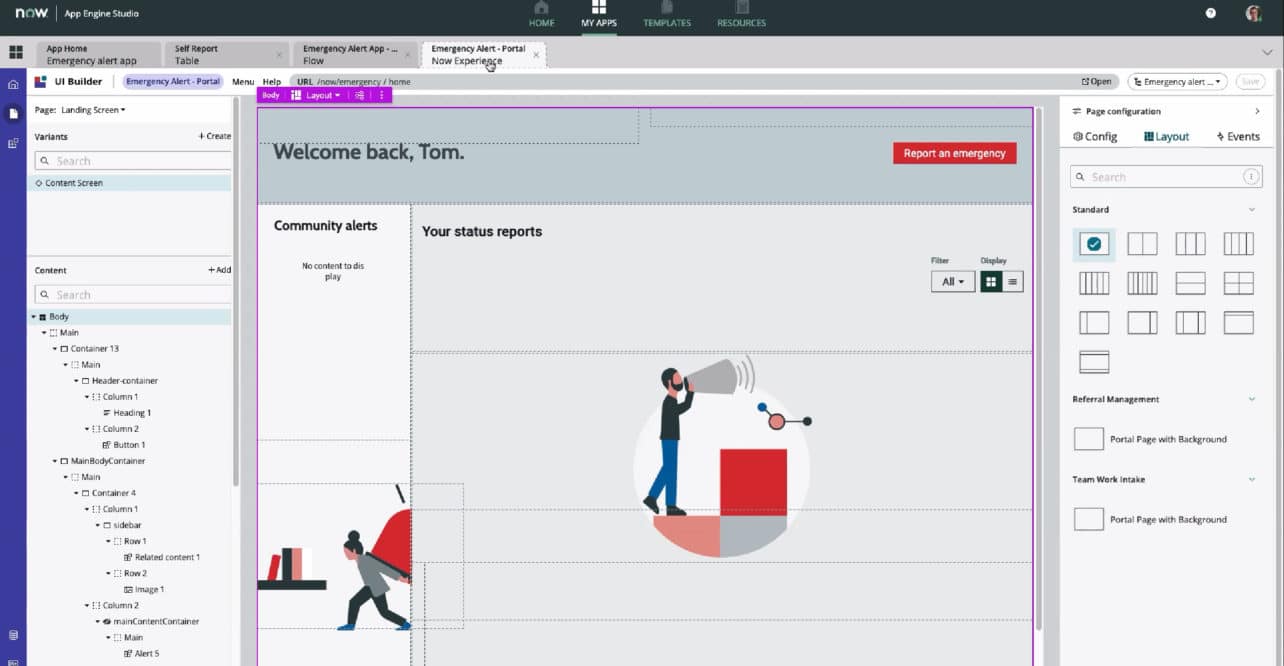
To help business users get started in building applications, ServiceNow has developed 11 templates to serve as examples. These can be completely adapted to suit your needs. The 11 templates are based on common scenarios. It’s also possible to develop an application that doesn’t appear to be in the templates, but you can reuse parts from the templates.
We also asked Pope about AI-assisted development. Although Pope has plenty to say about AI, it’s mainly focused on processing data that customers put into ServiceNow databases, rather than on developing applications themselves. It’s on ServiceNow’s wish list, but Pope thinks ServiceNow will have to make an acquisition to bring it into one of the upcoming releases.
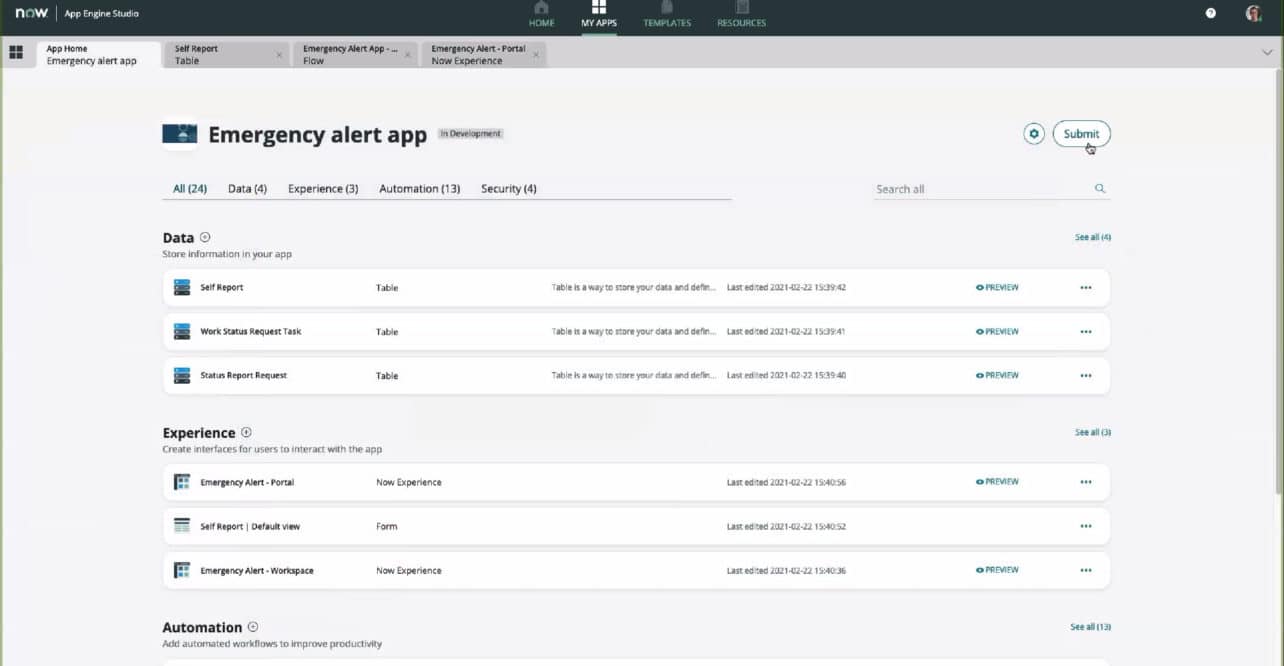
Building blocks and industry-specific solutions
Developing simple applications that do a little more than just a workflow will eventually work. ServiceNow will develop the necessary training courses and certifications for that purpose. Ultimately, ServiceNow wants to play a role at the heart of IT and business strategy. That means getting customers to develop larger applications and become more dependent on the ServiceNow platform. Something customers are often wary of.
ServiceNow hopes to convince customers by developing industry-specific solutions. For example, two applications are becoming available today: Financial Services Loan Operations and Telecommunications Order Management. Both solutions are fully functioning applications that were developed together with dozens of customers from the relevant industry. So ServiceNow has a ready-to-go loan platform for financial institutions and an order management system for telecom providers.
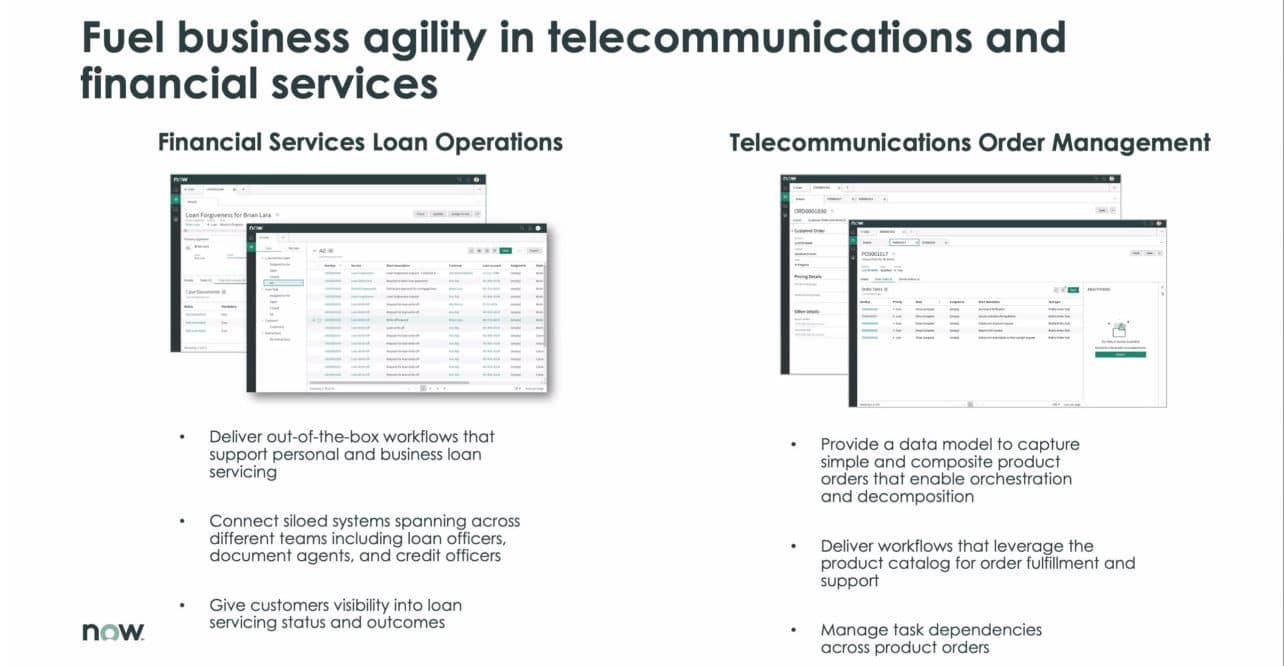
These applications are an ideal basis for organisations in these industries to build on. They can use the applications as the basis for their IT strategy because ServiceNow actively maintains and extends the applications. Also, the applications can be expanded and adapted entirely as required, using the App Engine Studio.
ServiceNow delivers the building blocks for developing crucial IT applications using low-code
These industry solutions are ultimately the building blocks for crucial IT applications. There are only two of these big industry-specific solutions now, but they won’t stop there.
Pope has already indicated that he expects them to work with some major integrators to present more industry solutions soon. He said that parties such as Accenture, Atos and Deloitte have so many industry experts in-house that it would be very valuable for ServiceNow to work with them. ServiceNow will undoubtedly work with some of these parties.
Smaller generic building blocks
In addition to these two large industrial applications, ServiceNow is also working on smaller generic applications that can serve as building blocks for larger applications. ISV and technology partners can offer applications and integrations in the ServiceNow Store. They can do so for free or at a cost. ServiceNow is also adding several applications today to help people get started with the App Engine Studio.
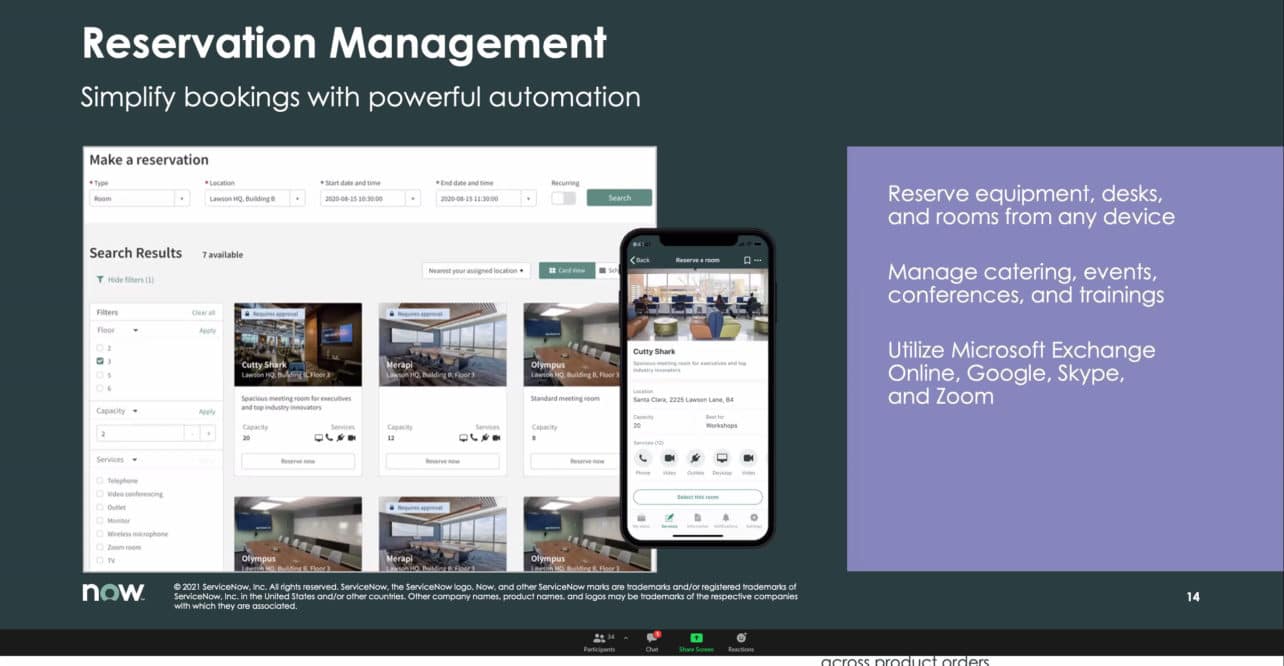
For example, the Reservation Management solution can be used for a wide range of purposes. With it, you can build an application that allows you to reserve things, whether it’s meeting rooms, taxis, your lunch or a hotel room. The application can be adapted to your wishes. There is also a visitor management system, which companies will undoubtedly want to use more as they reopen their offices. It can keep track of which visitors have been to a particular location.
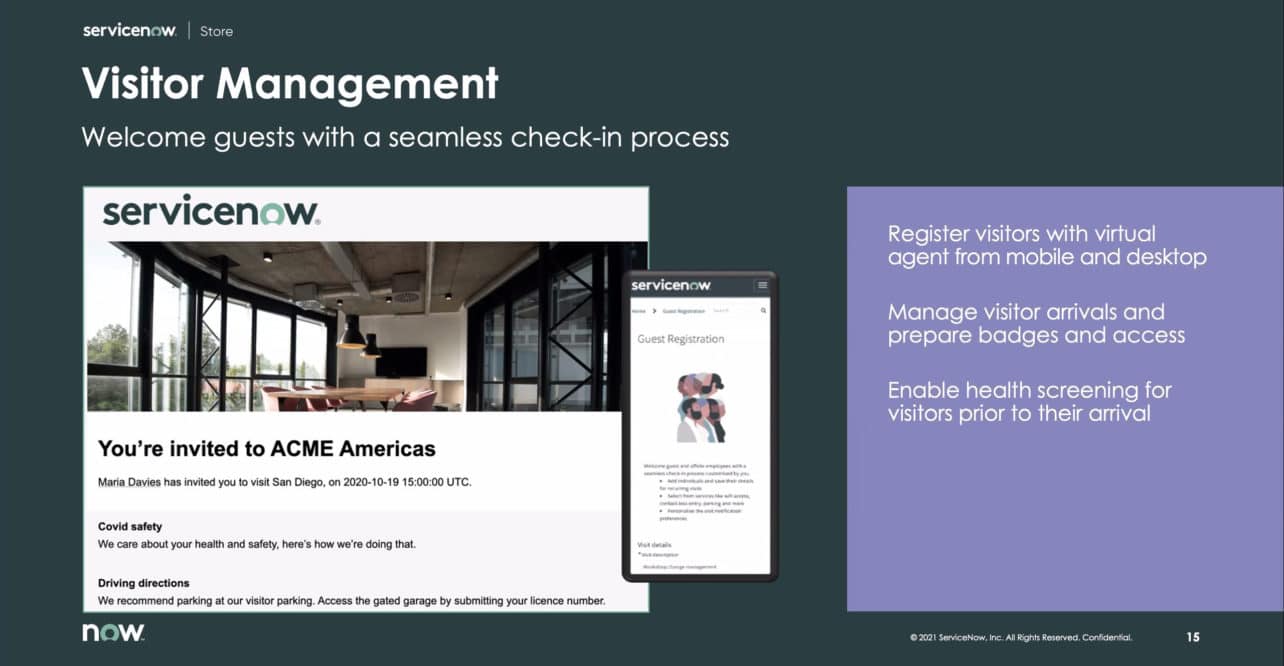
There is also an application that uses Mapped-in technology. This can be used to create a complete 3D environment of an office, determine routes or show locations where work can still be done or which are already fully booked.
All these applications are building blocks for developing larger applications. ServiceNow wants its platform to become a core component in the IT strategy of many companies. The ServiceNow platform will form the basis of every application, which will then be expanded with an app, interface or functionality.
Competition is fierce in low-code no-code
With ServiceNow App Engine Studio, you will not be building completely stand-alone applications; the platform always plays a role in the application’s core. In fact, it’s the same as with Salesforce, where they’re trying to do the same thing with the Lightning Platform and ISV partners.
On the other hand, you still have players like OutSystems and Mendix, with which you can develop independent applications. Mendix recently announced that it wanted to be active in as many areas as possible so that Mendix is an all-in-one platform for low-code application development.
This makes the low-code and no-code world somewhat competitive. On the one hand, you have powerful players like Salesforce and ServiceNow. They have an enormous amount of resources and workforce to develop their platforms, but perhaps more importantly, they can make the customer data in their platforms multi-applicable. While the somewhat smaller players, like Mendix and OutSystems, have to be active on all fronts and have to integrate well with the existing platforms to access the same data.
For companies, these independent solutions of Mendix and OutSystems are perhaps more attractive on paper because they are less tied to a platform and supplier. In some cases, companies have become somewhat allergic to lock-in. On the other hand, those SaaS platforms, from ServiceNow and Salesforce, are faster in delivering additional solutions for optimising business processes because the data is already in their platform.
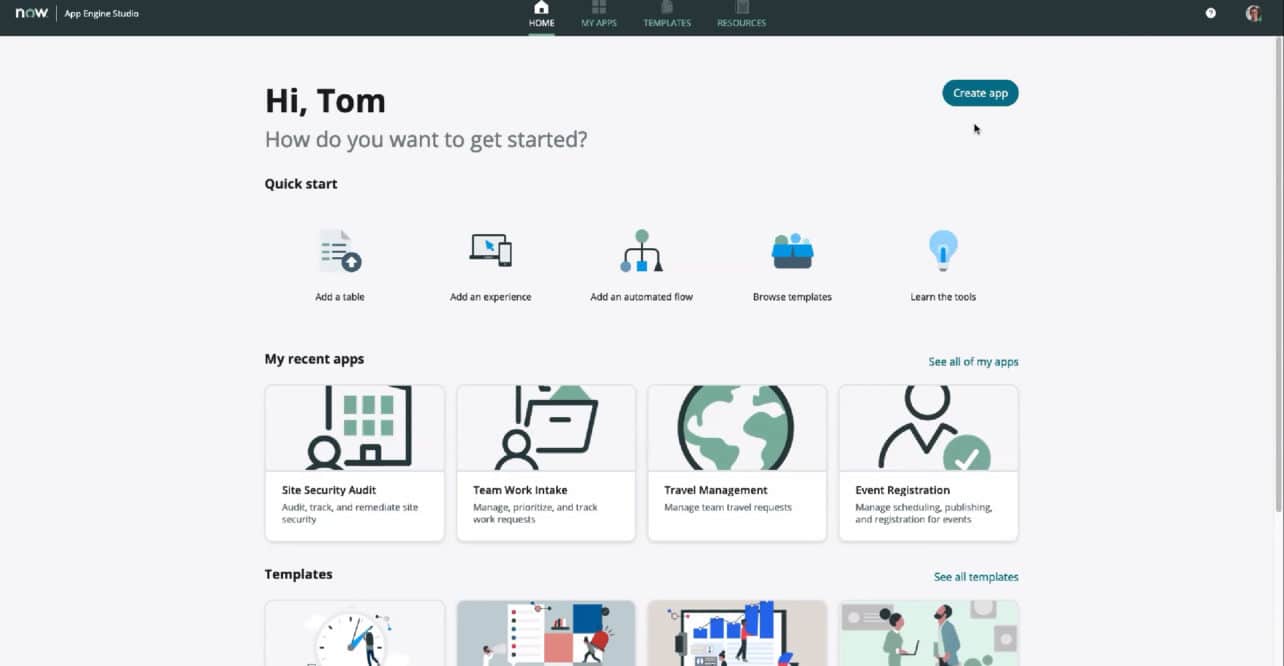
The good news for all parties is that the low-code and the no-code market are just starting to develop, it’s in its early days, and there is still a huge market to be won. For ServiceNow, it’s a logical step forward. It already has a good platform with IT, HR and other business data. Many companies are already optimising their business processes with ServiceNow workflows, so a logical next step is more and faster application development with ServiceNow.
We’re curious to see how ServiceNow will develop this further and how customers will respond. In any event, more and more major players see a future in low-code and no-code development.
Tip: ServiceNow launches Paris, faster response to transformation and IoT
